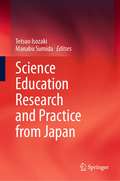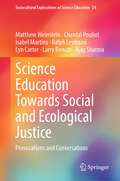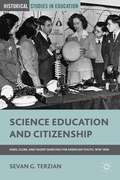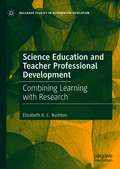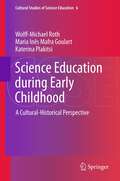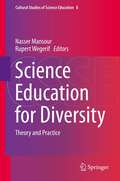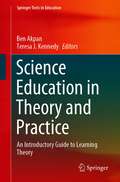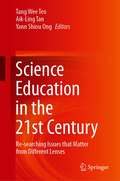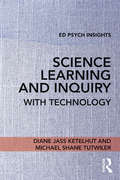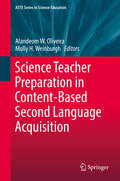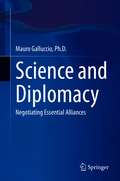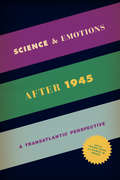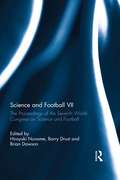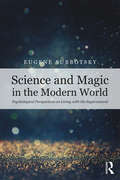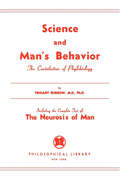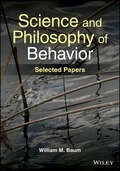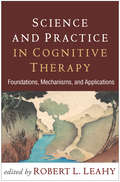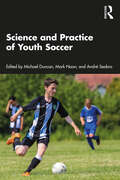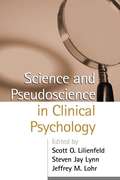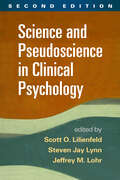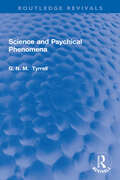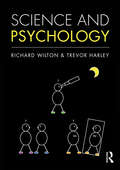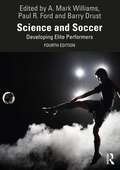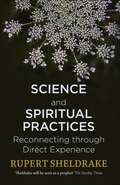- Table View
- List View
Science Education Research and Practice from Japan
by Manabu Sumida Tetsuo IsozakiThis book project poses a major challenge to Japanese science education researchers in order to disseminate research findings on and to work towards maintaining the strength and nature of Japanese science education. It also presents a unique opportunity to initiate change and/or develop science education research in Japan. It provides some historical reasons essential to Japanese students’ success in international science tests such as TIMSS and PISA. Also, it helps to tap the potential of younger generation of science education researchers by introducing them to methods and designs in the research practice.
Science Education Towards Social and Ecological Justice: Provocations and Conversations (Sociocultural Explorations of Science Education #24)
by Ralph Levinson Larry Bencze Ajay Sharma Lyn Carter Isabel Martins Matthew Weinstein Chantal PouliotThis book consists of stories of struggles in science education presented by a network of science educators working in Australia, Brazil, Canada, Britain, and the United States. The common goal of these educators is to produce more socially/ecologically just models and practices of science education. The book considers and reworks the key-terms of current social justice: agency, realism, justice, and power. Its first section explores re-inhabiting science in the quest for more just worlds including reterritorializing science within emergent theories of critical realism, engaging citizens activists with corporate science, and challenging neoliberalism and the forces that organize (structure) knowledge. The second section redefines praxis of science education itself through nuanced explorations of agency, decolonialism, and justice in ways that emphasize complexity, hybridity, ambivalence, and contradiction. The stories of this international group capture individual and collective efforts, motivated by a persistent sense that science and science education matter for questions of justice.
Science Education and Citizenship
by Sevan G. TerzianScience fairs, clubs, and talent searches are familiar fixtures in American education, yet little is known about why they began and grew in popularity. In Science Education and Citizenship, Sevan G. Terzian traces the civic purposes of these extracurricular programs for youth over four decades in the early to mid-twentieth century. He argues that Americans' mobilization for World War Two reoriented these educational activities from scientific literacy to national defense a shift that persisted in the ensuing atomic age and has left a lasting legacy in American science education.
Science Education and Teacher Professional Development: Combining Learning with Research (Palgrave Studies in Alternative Education)
by Elizabeth A. C. RushtonThis book presents a radical reconceptualization of subject-focused and research-led teacher professional development. Drawing on the experiences of more than 50 high school teachers and technicians who participated in science-based research with their students, the author examines how this enables teachers to develop a ‘Teacher Scientist’ model of professional identity. Through active participation in research, science teachers and technicians can implement socially just approaches to education, where students’ differences are valued and, through research, their social and academic development is supported. Central to the ‘Teacher Scientist’ identity is the development of, and sustained interaction with, complex and collaborative professional networks which include researchers, university-staff and teachers and students in other schools. In the context of persistent recruitment and retention challenges, the ‘Teacher Scientist’ model provides a research-led approach which may offer an alternative to strategies focused on financial incentives.
Science Education during Early Childhood
by Wolff-Michael Roth Maria Ines Mafra Goulart Katerina PlakitsiChildren's learning and understanding of science during their pre-school years has been a neglected topic in the education literature--something this volume aims to redress. Paradigmatic notions of science education, with their focus on biologically governed development and age-specific accession to scientific concepts, have perpetuated this state of affairs. This book offers a very different perspective, however. It has its roots in the work of cultural-historical activity theorists, who, since Vygotsky, have assumed that any higher cognitive function existed in and as a social relation first. Accepting this precept removes any lower limit we may deem appropriate on children's cognitive engagement with science-related concepts. The authors describe and analyze the ways in which children aged from one to five grapple with scientific concepts, and also suggest ways in which pre-service and in-service teachers can be prepared to teach in ways that support children's development in cultural and historical contexts. In doing so, the book affirms the value of cultural-historical activity theory as an appropriate framework for analyzing preschool children's participation in science learning experiences, and shows that that the theory provides an appropriate framework for understanding learning, as well as for planning and conducting training for pre-school teachers.
Science Education for Diversity: Theory and Practice
by Rupert Wegerif Nasser MansourReflecting the very latest theory on diversity issues in science education, including new dialogic approaches, this volume explores the subject from a range of perspectives and draws on studies from around the world. The work discusses fundamental topics such as how we conceptualize diversity as well as examining the ways in which heterogeneous cultural constructs influence the teaching and learning of science in a range of contexts. Including numerous strategies ready for adoption by interested teachers, the book addresses the varied cultural factors that influence engagement with science education. It seeks answers to the question of why increasing numbers of students fail to connect with science education in schools and looks at the more subtle impact that students' individually constructed identities have on the teaching and learning of science. Recognizing the diversity of its audience, the book covers differing levels and science subjects, and examines material from a range of viewpoints that include pedagogy, curricula, teacher education, learning, gender, religion, and ICT, as well as those of in-service and trainee teachers at all levels.
Science Education in Theory and Practice: An Introductory Guide to Learning Theory (Springer Texts in Education)
by Ben Akpan Teresa J. KennedyThis book provides a collection of applicable learning theories and their applications to science teaching. It presents a synthesis of historical theories while also providing practical implications for improvement of pedagogical practices aimed at advancing the field into the future. The theoretical viewpoints included in this volume span cognitive and social human development, address theories of learning, and describe approaches to teaching and curriculum development. The book presents and discusses humanistic, behaviourist, cognitivist, and constructivist theories. In addition, it looks at other theories, such as multiple intelligences theory, systems thinking, gender/sexuality theory and indigenous knowledge systems. Each chapter follows a reader-motivated approach anchored on a narrative genre. The book serves as a guide for those aiming to create optional learning experiences to prepare the next generation STEM workforce.
Science Education in the 21st Century: Re-searching Issues that Matter from Different Lenses
by Aik-Ling Tan Tang Wee Teo Yann Shiou OngThis book reflects on science education in the first 20 years of the 21st century in order to promote academic dialogue on science education from various standpoints, and highlights emergent new issues, such as education in science education research. It also defines new research agendas that should be “moved forward” and inform new trajectories through the rest of the century. Featuring 21 thematically grouped chapters, it includes award-winning papers and other significant papers that address the theme of the 2018 International Science Education Conference.
Science Learning and Inquiry with Technology (Ed Psych Insights)
by Diane Jass Ketelhut Michael Shane TutwilerWhen implemented effectively, technology has great potential to positively connect with learning, assessment, and motivation in the context of K–12 science education and inquiry. Written by leading experts on technology-enhanced science learning and educational research, this book situates the topic within the broader context of educational psychology research and theory and brings it to a wider audience. With chapters on the fundamentals of science learning and assessment, integration of technology into classrooms, and examples of specific technologies, this concise volume is designed for any course on science learning that includes technology use in the curriculum. It will be indispensable for student researchers and both pre- and in-service teachers alike.
Science Teacher Preparation in Content-Based Second Language Acquisition
by Alandeom W. Oliveira Molly H. WeinburghThe primary purpose of this book is to provide science teacher educators with exemplars of professional development programs designed to prepare school teachers to effectively help language learners in science classrooms simultaneously gain language proficiency and conceptual understanding. To this end, this book examines seventeen science teacher preparation programs that span a wide variety of grade levels (elementary, middle, and secondary), countries (Italy, Luxemburg, Spain, UK, and US), and linguistic contexts (English as a Second Language, English as a Foreign Language, trilingual classrooms, and teaching deaf children science through sign language). The book is divided into three main parts. Each part consists of chapters that illustrate a common, cross-cutting theme in science teacher preparation in content-based second language acquisition, namely pre-service teacher preparation, in-service teacher preparation, and international perspectives. Each part provides many insights on the similarities and differences in the professional development approaches used to prepare science teaching with varied amounts of instructional experience help students in different parts of the world overcome linguistic barriers while simultaneously learning concepts central to science. Bringing together researchers from various academic backgrounds (science education, TESOL, and Applied Linguistics), attention is given to varied facets of the intersection of science and language learning in the specific context of school teacher preparation.
Science and Diplomacy: Negotiating Essential Alliances
by Mauro Galluccio, Ph.D.This book lays the groundwork for a new field of study and research in the intersection between science and diplomacy. It will review the multi-disciplinary research in this burgeoning area in providing the scientific foundation for the application of psychological principles to understanding and facilitating political decisions in an international context. Focusing on how people think, act, and feel on both individual and collective levels, this book takes into account a realistic perspective from which transformative processes can emerge. It follows the ongoing debate in the EU and the world in providing a better understanding of the tools that can be deployed to improve communication and cooperation between scientists, politicians, and diplomats in this field. The failure of communication in this COVID-19 planetary crisis has not been about whether or not objectives have been achieved, but about the ability of major actors to cooperate to forge links with people. The way policymakers and scientists will manage their interpersonal negotiations will be of great importance in fostering international cooperation and coordinated problem-solving behaviours. Otherwise, science diplomacy will lose sight of its most important purpose: that of helping to solve problems, conflicts, and diplomatic processes for the sake of humanity.
Science and Emotions after 1945: A Transatlantic Perspective
by Edited by Frank Biess Daniel M. GrossThrough the first half of the twentieth century, emotions were a legitimate object of scientific study across a variety of disciplines. After 1945, however, in the wake of Nazi irrationalism, emotions became increasingly marginalized and postwar rationalism took central stage. Emotion remained on the scene of scientific and popular study but largely at the fringes as a behavioral reflex, or as a concern of the private sphere. So why, by the 1960s, had the study of emotions returned to the forefront of academic investigation? In Science and Emotions after 1945, Frank Biess and Daniel M. Gross chronicle the curious resurgence of emotion studies and show that it was fueled by two very different sources: social movements of the 1960s and brain science. A central claim of the book is that the relatively recent neuroscientific study of emotion did not initiate #150; but instead consolidated #150; the emotional turn by clearing the ground for multidisciplinary work on the emotions Science and Emotions after 1945 tells the story of this shift by looking closely at scientific disciplines in which the study of emotions has featured prominently, including medicine, psychiatry, neuroscience, and the social sciences, viewed in each case from a humanities perspective.
Science and Football VII: The Proceedings of the Seventh World Congress on Science and Football
by Brian Dawson Hiroyuki Nunome Barry DrustScience and Football VII showcases the very latest scientific research into the variety of sports known as ‘football’. These include soccer, the national codes (American football, Australian rules football and Gaelic football), and the rugby codes (union and league). Bridging the gap between theory and practice, this book is by far the most comprehensive collection of current research into football, presenting important new work in key areas such as: physiology of training performance analysis fitness assessment nutrition biomechanics injury and rehabilitation youth football environmental physiology psychology in football. Science and Football VII is an essential resource for all sport scientists, trainers, coaches, physical therapists, physicians, psychologists, educational officers and professionals working across the football codes. The papers contained within this volume were first presented at the Seventh World Congress on Science and Football, held in May 2011 in Nagoya, Japan. The meeting was held under the auspices of the International Steering Group on Science and Football, a representative member of the World Commission of Science and Sports.
Science and Magic in the Modern World: Psychological Perspectives on Living with the Supernatural
by Eugene V. SubbotskyScience and Magic in the Modern World is a unique text that explores the role of magical thinking in everyday life. It provides an excellent psychological look at the subconscious belief in magic in both popular culture and society, as well as experimental research that considers human consciousness as a derivative of belief in the supernatural, thus showing that our feelings, emotions, attitudes and other psychological processes follow the laws of magic. This book synthesises the science of ‘natural’ phenomena and the magic of the ‘supernatural’ to present an interesting look at the juxtaposition of the inner and outer selves. Fusing research into psychological disorders, subconscious feelings, as well as the rising presence of artificial intelligence, this book demonstrates how an engagement with magical thinking can enhance one’s creativity and cognitive skills. Science and Magic in the Modern World is an invaluable resource for those studying consciousness, as well as those looking at the effect of magical thinking on religion, politics, science and society.
Science and Man's Behavior
by Trigant BurrowEdited and compiled by William E. Galt after Burrow's death, Science and Man's Behavior: The Contribution of Phylobiology details the practices and therapies of one of the founding fathers of behavioral psychology. As a psychologist, Burrow was most interested in understanding and resolving man's behavioral conflict. He worked to shed light on behavioral disorders through his use of group- and phylo-therapy. Join Galt on a journey through Burrow's theories and practices in this important early text on a groundbreaking twentieth-century methodology. Trigiant Burrow was a founder of phylobiology and was a pioneer of using phyloanalysis as a therapy tool. Burrow was a trained doctor, biologist, and psychologist who specialized in experimental psychology. He studied psychoanalysis with Carl Jung and brought the European techniques to the United States. He studied and practiced experimental and behavioral psychology in Baltimore, Maryland for most of his life.
Science and Philosophy of Behavior: Selected Papers
by William M. BaumRediscover the science and philosophy of behavior In Science and Philosophy of Behavior: Selected Papers, distinguished researcher W. M. Baum delivers an expansive collection of incisive papers setting out a new paradigm of thinking about behavior. The book offers only articles that put forward a philosophical and theoretical framework for an effective natural science of behavior. Quantitative analysis is largely avoided (except for a paper on, of all things, avoidance). Organized into three parts, the author explains the flow-like nature of behavior and its link to evolution, as well as descriptions of a pure form of behaviorism that correct some flaws in B.F. Skinner&’s seminal works. The book also links behaviorism to anthropology in its final section. Readers will also find: Fulsome descriptions of the molar nature of behavior and why the molecular view is misguided Re-imaginations of the concept of reinforcement, including considerations of allocation, induction, and contingency Explorations of the links between behavior analysis and Darwinian evolutionary processesAn essential critique—and reorganization—of behavior theory and philosophy, Science and Philosophy of Behavior: Selected Papers is a controversial, fascinating, and eye-opening journey through a half-century of transformational work in the field.
Science and Practice in Cognitive Therapy: Foundations, Mechanisms, and Applications
by Robert L. LeahyFrom leading experts in cognitive-behavioral therapy (CBT)--including CBT originator Aaron T. Beck and many who have worked closely with him--this book provides an overview of where the field is today and presents cutting-edge research and clinical applications. Contributors explain how Beck's cognitive model has been refined and tested over the last 45 years and describe innovative CBT approaches that integrate mindfulness, imagery, emotion-focused interventions, and other strategies. Chapters on specific clinical problems cover the conceptualization and treatment of depression, anxiety disorders, posttraumatic stress disorder, obsessive–compulsive disorder, insomnia, suicidality, substance abuse, couple and family problems, bipolar disorder, psychosis, and personality disorders.
Science and Practice of Youth Soccer
by Mark Noon Michael Duncan André SeabraSoccer remains the world’s most popular sport with significant numbers of the world’s population engaged in grassroots soccer, particularly during childhood and adolescence. There is considerable scientific and practical data focused on soccer science available, most of which relates to elite performers and does not address the needs to grassroots coaches in understanding the science of soccer and translating this into practical messages and learning to help coaches maximise the experiences, enjoyment and development of the more than 250 million players who play grassroots soccer worldwide. Science and Practice of Youth Soccer presents a comprehensive and accessible introduction to key topics relating to effective player and team development in youth grassroots soccer. Written by international experts and practitioners in the field and with a particular emphasis on the development of children and youth, the book provides essential guidance of how science translates into practice for coaches and those working in youth grassroots soccer. Each chapter outlines the scientific research base for each topic, highlights myths and misconceptions that are commonplace in current practice of grassroots coaches and then provides practical solutions that coaches can take and use in their coaching practice. This book is key reading to those working in or studying sport and exercise science, sports coaching and sports development and also of interest to grassroots coaches and parents of soccer players.
Science and Practice of Youth Soccer
by Mark Noon Michael Duncan André SeabraSoccer remains the world’s most popular sport with significant numbers of the world’s population engaged in grassroots soccer, particularly during childhood and adolescence. There is considerable scientific and practical data focused on soccer science available, most of which relates to elite performers and does not address the needs to grassroots coaches in understanding the science of soccer and translating this into practical messages and learning to help coaches maximise the experiences, enjoyment and development of the more than 250 million players who play grassroots soccer worldwide.Science and Practice of Youth Soccer presents a comprehensive and accessible introduction to key topics relating to effective player and team development in youth grassroots soccer. Written by international experts and practitioners in the field and with a particular emphasis on the development of children and youth, the book provides essential guidance of how science translates into practice for coaches and those working in youth grassroots soccer. Each chapter outlines the scientific research base for each topic, highlights myths and misconceptions that are commonplace in current practice of grassroots coaches and then provides practical solutions that coaches can take and use in their coaching practice.This book is key reading to those working in or studying sport and exercise science, sports coaching and sports development and also of interest to grassroots coaches and parents of soccer players.
Science and Pseudoscience in Clinical Psychology
by Scott LilienfeldThis book offers a rigorous examination of a variety of therapeutic, assessment, and diagnostic techniques in clinical psychology, focusing on practices that are popular and influential but lack a solid grounding in empirical research. Featuring chapters from leading clinical researchers, the text helps professionals and students evaluate the merits of novel and controversial techniques and differentiate between those that can stand up to scientific scrutiny and those that cannot. Reviewed are widely used therapies for alcoholism, infantile autism, and ADHD; the use of EMDR in the treatment of posttraumatic stress disorder; herbal remedies for depression and anxiety; suggestive techniques for memory recovery; and self-help models. Other topics covered include issues surrounding psychological expert testimony, the uses and abuses of projective assessment techniques, and unanswered questions about dissociative identity disorder. Offering a balanced, constructive review of available research, each accessibly written chapter concludes with a glossary of key terms.
Science and Pseudoscience in Clinical Psychology, Second Edition
by Carol Tavris Scott O. Lilienfeld Steven Jay Lynn Jeffrey M. LohrThis valued resource helps practitioners and students evaluate the merits of popular yet controversial practices in clinical psychology and allied fields, and base treatment decisions on the best available research. Leading authorities review widely used therapies for a range of child, adolescent, and adult disorders, differentiating between those that can stand up to the rigors of science and those that cannot. Questionable assessment and diagnostic techniques and self-help models are also examined. The volume provides essential skills for thinking critically as a practitioner, evaluating the validity of scientific claims, and steering clear of treatments that are ineffective or even harmful. New to This Edition *Reflects the significant growth of evidence-based practices in the last decade. *Updated throughout with the latest treatment research. *Chapter on attachment therapy. *Chapter on controversial interventions for child and adolescent antisocial behavior. *Addresses changes in DSM-5.
Science and Psychical Phenomena (Routledge Revivals)
by G. N. TyrrellFirst published in 1938, Science and Psychical Phenomena presents a comprehensive overview of diverse field of phenomena which is included under the heading of psychical research. Psychical research does not deal in Spiritualism or ‘Spooks’. It is the scientific investigation of the hidden faculties of Man, and it constitutes the main pathway to the understanding of the Human Individual. Since second half of nineteenth century, unknown to the general public, careful work with new methods has been going on, and the results when properly understood, are as startling as they are important. The present volume summarizes the work and discusses the far-reaching conclusion to which it points. This book is an important historical document for scholars and researchers of religion, psychology, philosophy of mind and psychic studies.
Science and Psychology
by Richard Wilton Trevor HarleyScience and Psychology provides a comprehensive introduction to the structure and characteristics of scientific explanation, using examples from a variety of sciences to illuminate the scientific approach taken in psychology. In addition, the authors discuss a range of conceptual issues particular to psychology. They examine the concepts of free will, consciousness, and purposeful behaviour, and consider the social implications of possible future changes in our understanding of these concepts and of?ourselves. The final chapters of the book provide an account of what psychology can tell us about the history and origins of science. Assuming no previous understanding of either the philosophy of science or any science other than psychology, Science and Psychology is an ideal resource for both final year undergraduates and postgraduates studying psychology. Psychologists and other scientists who wish to further their understanding of the relationship between psychology and the natural sciences may also find the contents to be of interest.
Science and Soccer: Developing Elite Performers
by A. Mark Williams Barry Drust Paul R. FordNow in a fully revised and updated fourth edition, Science and Soccer is still the most comprehensive and accessible introduction to the physiology, biomechanics and psychology behind the world's most popular sport. Offering important guidance on how science translates into practice, the book examines every key facet of the sport, with a particular focus on the development of expert performers. The topics covered include: • anatomy, physiology, psychology; sociology and biomechanics; • principles of training; • nutrition; • physical and mental preparation; • playing surfaces and equipment; injury • decision-making and skill acquisition; • coaching and coach education; • performance analysis; • talent identification and youth development. Science and Soccer: Developing Elite Performers is a unique resource for students and academics working in sports science. It is essential reading for all professional support staff working in the game, including coaches at all levels, physiotherapists, conditioning specialists, performance analysts, club doctors and sport psychologists.
Science and Spiritual Practices: Reconnecting through direct experience
by Rupert SheldrakeIn this pioneering book Rupert Sheldrake shows how science helps validate seven practices on which all religions are built, and which are part of our common human heritage:· Meditation· Gratitude· Connecting with nature· Relating to plants· Rituals· Singing and chanting· Pilgrimage and holy places. The effects of spiritual practices are now being investigated scientifically as never before, and many studies have shown that religious and spiritual practices generally make people happier and healthier. Rupert Sheldrake summarizes the latest scientific research on what happens when we take part in these practices, and suggests ways that readers can explore these fields for themselves. For those who are religious, Science and Spiritual Practices will illuminate the evolutionary origins of their own traditions and give a new appreciation of their power. For the non-religious, this book will show how the core practices of spirituality are accessible to all, even if they do not subscribe to a religious belief system. This is a book for anyone who suspects that in the drive towards radical secularism, something valuable has been left behind. Rupert Sheldrake believes that by opening ourselves to the spiritual dimension we may find the strength to live more wholesome and fulfilling lives.
